LONG BUCKBY
CONGREGATIONAL CHURCH
A BRIEF HISTORICAL
SKETCH
LESLIE S. IVORY
- The origin of Long Buckby
Congregational Church is lost in obscurity as no records of its
beginnings or early history have been preserved. The tradition that
the church was formed in 1707 cannot be far wrong even though the
truth of it cannot be verified. The first reliable information is a
record of the presence of Mr. J. Jackson, minister at Long Buckby,
at the ordination service of Mr. Tingey at Castle Hill Meeting,
Northampton on 2nd February, 1709, and it is safe to conjecture that
the church was in existence a year or two prior to this. If the past
could be unravelled, we should find it of great interest to see if
there were any connections between the foundation of the church and
those few people who, in the time of Charles I, came from Althorp to
Buckby for a prayer meeting, or those who made their way from Buckby
to Norton to hear the Rev. Richard Allen before his ejectment in
1662, or the one from Long Buckby who was received into the
membership of the Rothwell Congregational Church during the
ministry of the Rev. Richard Davies. No doubt, these are all
fragments of a pre-history of the church.
-
-
The Rev. Thomas Cartwright was
minister from 1720 to 1744. He had been licensed by the Cheshire
Classis on 26th November, 1711, and must have ministered elsewhere
before coming to Buckby. Information about him is scant and is
mostly concerned with the ordinations he attended. In 1721 he "
began with prayer and prayed well " at the ordination of Mr.
Sanders at Kettering; in 1738 he was present at Mr. Hextal's
ordination at Creaton and in 1740 he was engaged in the ordination
of Mr. J. Heywood at Potterspury. What is more precious is the
inscription which was on his gravestone in the Buckby Parish
Churchyard. The stone has long since worn away with age and weather
and we are greatly indebted to the historian who made a copy of the
inscription before it was too late. The inscription ran:—
In memory of the Rev. Mr. THOMAS
CARTWRIGHT,
who
died April 13th,
1744, aged
57;
having by a diligent,
faithful, and humble discharge
of the various duties
of the Christian and
ministerial life
obtained a good
report of all men,
and of the truth
itself;
being most highly
esteemed of those
by whom he was most
intimately known.
The next minister
was the Rev. John Walker, who was one of Dr. Doddridge's students. He
settled at Long Buckby in 1751 and remained until 1760 when he
accepted a call to Framlingham in Suffolk. Later, he moved to Walpole
where he died in 1805. It was said that " he was a man of good
sense, of great simplicity of manners, and of eminent piety and
devotion." Another writer describes him as being ". . . .of
moderate orthodoxy " but Priestly who became a Unitarian said
joyously to him in 1794, " Ah, Walker, it was you that first led
one astray from the paths of orthodoxy."
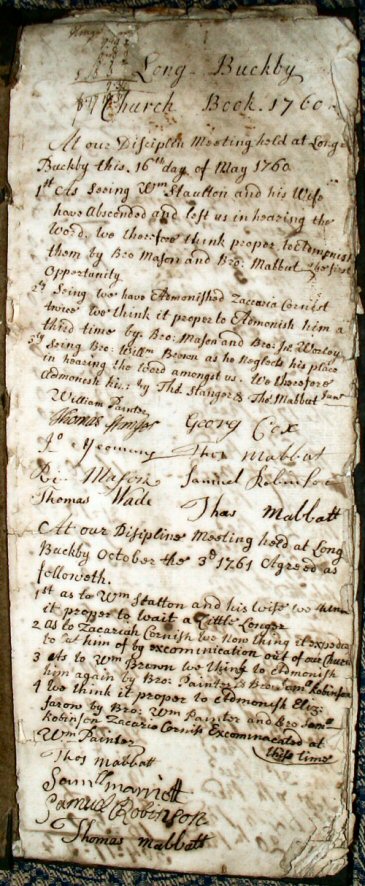 After
Mr. Walker's departure, there was an interregnum until 1763.
Although pastorless, the church managed to weather the storm, though
it would appear that many members were admonished for non-attendance
during this period. The following is a copy of one of the few
records we have of the period :—
After
Mr. Walker's departure, there was an interregnum until 1763.
Although pastorless, the church managed to weather the storm, though
it would appear that many members were admonished for non-attendance
during this period. The following is a copy of one of the few
records we have of the period :—
" At our Discipline Meeting held
at Long buckby on Nov ye 27 1762. after prayer Agreed as followeth
" first as to
our Bro and Sister Storton
hath not come to our Meeting for sum time but have gon to another
meeting we think it our duty to Admonish them to return and we do
appoint our Bro Yomans and Bro Tho Mabatt to Admonish them to return
to there Duty.
- " 2d agreed to Admonish our
Bro Brown that he keeps his place in hereing the Word of God and we
do appoint our Bro Tho Mabatt and our Bro Saml Robinson to Admonish
him
-
" 3d as to our Sister Farow
hath not come to the Meeting of Late we think it our Duty to
Admonish her to her duty to keep her place In the House of the Lord
and we do Appoint our Bro Saml Robinson and Bro Tho Mabatt ye Elder
to Admonish her
-
" 4d as our Bro Mcrill he
Neglects coming to here the Word of God on the Lords day we as a
church think it our duty to desire him to make Good his place In The
House of the Lord and we do appoint our Bro Yeomans and Bro Tho
Mabatt and Bro Robinson to Admonish him.
-
" 5d. Agreed to agurn this
meeting to the Next opportunity. JOHN YEOMANS Elder THOS MABBATT
THOS MABBATT SAML MARRIOTT SAML ROBINSON."
-
In 1763 the Rev. Richard Denny was
called to the pastorate. He was born at Barby, a village about six
miles from Buckby, and served an apprenticeship at Lutterworth. His
work took him to London where he came under the influence of
Whitfield and in due course, became a student at Doddridge's
Academy. After ministeries at Keysoe (1751- 1761) and Little Badow
(1761-1763), he settled at Buckby. Here was the scene of the largest
portion of his ministerial life, his labour, and his success. At one
particular time he was honoured with what was considered as
remarkable success, for after repeatedly complaining of the want of
a blessing on his work and feeling greatly discouraged, he "
wrestled hard by fervent and constant prayer for a blessing to
attend his efforts." The Master granted him the blessing he
desired. There was an extraordinary revival in the congregation and
in the course of two or three years about forty members were added
to the church.
-
It was during Mr. Denny's ministry
that the present Meeting House was built. Before this time, worship
was conducted in a small building in the paddock which is opposite
to the railings of the present Manse garden. When Whitfield preached
at Buckby on his tour through Northamptonshire into Leicestershire
the service was held in this field.
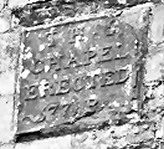 The new Meeting House was built
and opened for worship in 1771. There are no records to tell us of
the intense joy that would be in the heart of the worshippers, or
the exultant praise on their lips. We can only imagine their
feelings and be thankful to Almighty God for His guidance and their
enterprise.
The new Meeting House was built
and opened for worship in 1771. There are no records to tell us of
the intense joy that would be in the heart of the worshippers, or
the exultant praise on their lips. We can only imagine their
feelings and be thankful to Almighty God for His guidance and their
enterprise. -
-
In consequence of advancing years,
Mr. Denny resigned his charge in 1795 though he continued to reside
in Buckby until his death in 1813. He was the last surviving student
of Dr. Doddridge for whom he held a great respect and in his last
hours, he said, " I shall soon see the blessed, blessed,
Redeemer and the dear Doctor Doddridge." His remains were
interred near to the pulpit in the Meeting House he had been
instrumental in building.
-
-
The Rev. William Mosely began his
ministry in 1795, and in the same year, the Manse was either built
or purchased as a dwelling house and reconstructed as a Manse. Mr.
Mosely was trained for the ministry at Hoxton Academy and came to
Buckby after two short ministries, one at Gold Hill (circ. 1792) and
the other at Atherstone (1793-1795).
-
-
He was a cultured scholar and an
enthusiast for Missions. Whilst at Buckby he published a pamphlet
entitled " A Memoir of the importance &c. of translating
the Holy Scriptures into the Chinese language." The memoir was
concerned with the state of religion in China, and urged the
importance and practicability of a serious attempt to propagate
Christianity through that vast but neglected empire. When the
British and Foreign Bible Society was formed, one of its first
enterprises was an attempt to publish some part of the Scriptures in
Chinese and as most of the active Committee members were acquainted
with Mr. Mosely's Memoir, official correspondence was sent to him
and consequently he was invited to serve on the sub-committee of the
Society dealing with the publication of the Chinese manuscript.
-
-
Unfortunately, this scheme failed,
but in due time the task was accomplished under the more
advantageous conditions in Serampore and Canton. See History of the
British and Foreign Bible Society by W. Canton, vol. I, p. 24, and
History of the British and Foreign Bible Society by John Owen, vol.
I, pp. 89 and 97.
-
-
Mr. Mosely stayed at Buckby until
1803 when he accepted a call to Hartley Tabernacle. The story is
told in A. (J. Matthews' " The Congregational Churches of
Staffordshire " of a certain William Salt who attended Hanley
Tabernacle on one occasion and was so impressed by Mr. Mosely's
sermon that he not only became " an earnest inquirer," but
also returned to his master from whom he had run away and served out
the remaining years of his apprenticeship. Shortly afterwards he
went to Hoxton Academy to train for the ministry and later was the
minister of Lichfield Congregational Church.
-
-
Mr. Mosely was succeeded by the Rev.
Daniel Griffiths who commenced his stated Ministry at Buckby on 27th
March, 1803. Mr. Griffiths was trained at Homerton College and had
spent a four years' ministry at Alton before accepting the call to
Long Buckby. He was ordained at Buckby on 17th November, 1803 when
Mr. Anthony of Bedford began the service by prayer and reading the
scriptures; Mr. Horsey of Northampton delivered the introductory
discourse, asked the questions and received the confession of faith;
Mr. Denny, the former pastor offered the ordination prayer; Mr.
Toller of Kettering gave the charge from I Tim. iv 13-16; Mr. Gill
of Harborough addressed the people from Deut. I 38; Mr. Knight and
Mr. Morrell were engaged in the devotional parts of the service; and
Mr. Cox of Clipston preached in the evening from Matt, vi 33.
-
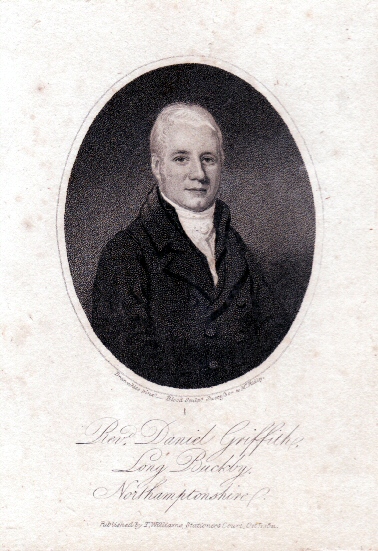 The
ministry of Mr. Griffiths continued at Buckby for 39 years. In 1819,
the congregation having much increased " the chapel was
enlarged and a fourth gallery was erected behind the pulpit. In the
September of that year, the chapel was re-opened and special sermons
on the occasion were preached by the Revs. Toller of Kettering and
Robertson of Stretton. In 1825, a new schoolroom was erected by a
legacy of Mr. David Ashby supplemented by other members of the
family. During the ministry of Mr. Griffiths, the village chapels at
East Haddon and Whilton were erected. Mr. Griffiths used to "
lecture " once a month in a private house in East Haddon and so
many people desired to hear him that
the accommodation was soon insufficient and a
chapel was built. This did not please (the squire of that time and
he gave notice to the farmers on his estate that if they continued
to deal with or employ shopkeepers who attended dissenting services,
they would he removed from their farms. Although legal help was
sought, nothing effective could he done and the tradespeople
concerned lost the custom of nearly all the farmers in the parish.
In spite of these difficulties, the chapel was completed in 1811.
The
ministry of Mr. Griffiths continued at Buckby for 39 years. In 1819,
the congregation having much increased " the chapel was
enlarged and a fourth gallery was erected behind the pulpit. In the
September of that year, the chapel was re-opened and special sermons
on the occasion were preached by the Revs. Toller of Kettering and
Robertson of Stretton. In 1825, a new schoolroom was erected by a
legacy of Mr. David Ashby supplemented by other members of the
family. During the ministry of Mr. Griffiths, the village chapels at
East Haddon and Whilton were erected. Mr. Griffiths used to "
lecture " once a month in a private house in East Haddon and so
many people desired to hear him that
the accommodation was soon insufficient and a
chapel was built. This did not please (the squire of that time and
he gave notice to the farmers on his estate that if they continued
to deal with or employ shopkeepers who attended dissenting services,
they would he removed from their farms. Although legal help was
sought, nothing effective could he done and the tradespeople
concerned lost the custom of nearly all the farmers in the parish.
In spite of these difficulties, the chapel was completed in 1811. -
-
Mr. Griffiths resigned the Buckby
pastorate on 19th December, 1841 and lived in retirement with his
son, the Rev. Daniel Griffiths, of Cannock. He died in 1862 at the
age of 82.
-
-
After the resignation of Mr,
Griffiths, the congregation was supplied for sometime chiefly by the
students of Spring Hill College; but in due course an invitation was
sent to Mr. James Apperley, a student of Blackburn Academy who
entered on his pastoral duties on 2nd October, 1842. A volume of Mr.
Apperley's sermons was published under the title " Revealed
Truth Vindicated " and such subjects as " A Divine
Revelation Necessary," " The Credibility of the Scriptures
" and " The Rapid Spread of Christianity " are dealt
with in a scholarly manner.
-
Unhappily, a difference arose
between him and the congregation, and a deputation requested him to
resign, a step he was not prepared to take. Hence, a large and
influential part of the congregation left and joined the Baptist
Church. This withdrawal considerably weakened the church and
congregation. In 1852, Mr. Apperley resigned and emigrated to
Australia. The faithful few who remained presented him with a purse
of thirty guineas as a token of respect. His subsequent pastorates
were Ashby Street, Geelong (1856-1868) and Jan Jac, Victoria
(1868-1879) from whence he retired to Bombay, New Zealand, where he
died in 1885.
-
-
Mr. Apperley's successor was the
Rev. Francis Evans. He was born near Aberystwyth in 1812 and was
intended to follow his father's calling of a farmer. His parents
belonged to the Church of England and he himself was confirmed by
Bishop Burgess of Salisbury. Later, his views on church government
underwent a change and he entered the Independent- Academy at
Blackburn as a candidate for the ministry. After a short ministry in
the Manchester area, he removed to Ulverston where he ministered for
seventeen years. This ministry ended because of some tension in the
Diaconate. We can gather some indication of the nature of his
farewell sermon from the hymn " appropriate to the discourse "
which was sung on that occasion. It was Watts' version of Psalm 12.
-
-
" Help, Lord ! for men of
virtue fail, Religion loses ground, The sons of violence prevail,
And treacheries abound ! "
-
Mr. Evans commenced his ministry at
Long Buckby on 31st October, 1852. Although the Church Book records,
" Nothing of any importance seems to have occurred during his
stay," it appears that the church was more settled than it had
been for some time. The summary of membership in 1858 is as
follows:—
-
-
41 Already members
-
8 Re-admitted
-
7 Transferred from other churches
-
15 New Converts
-
72
-
=====
-
7 Died
-
====
-
65
-
During his residence at Long Buckby,
he married a daughter of the Rev. Thomas Coleman of Kettering.
-
-
It was in 1858, during a visit to an
old friend in Ulverston that Mr. Evans preached to his former
congregation. " At the sight of the old place—and the
familiar faces—there was a gush on both sides; differences
were forgotten, and he returned to Ulverston and laboured with much
success for upwards of ten years."
-
-
Mr. Evans preached his farewell
sermons at Long Buckby on the last Sunday in August, 1858. Little
did the folk realise that he was the master of seven languages and
had a taste for scientific pursuits, for " he was a man of a
very retiring disposition " and " had many accomplishments
of which none but his most intimate friends had any knowledge."
-
Mr. Evans died very suddenly when
crossing in a boat from Barrow to Wulney on 16th August, 1869.
-
-
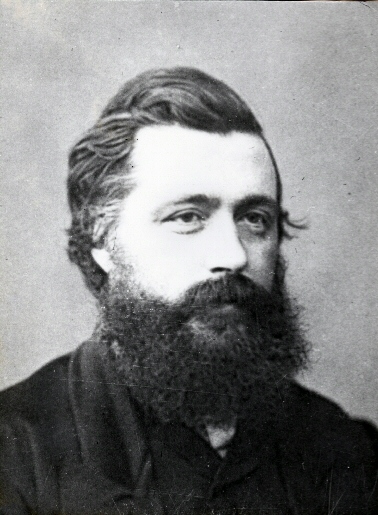 The
Rev. Henry William Butcher who succeeded Mr. Evans in the Buckby
pastorate was born in London in 1833. His parents were Wesleyans and
to their simple teaching he owed much, but when he left home, he met
situations which seemed to attract him from the Christian way of
life. A spiritual experience, however, led him to become a member of
Claremont Chapel, Pentonville in 1851. Sometime later he felt
impelled to enter the ministry and with the help of his revered
pastor, the Rev. John Blackburn, he prepared himself for the work
and was admitted to Cheshunt College for training. After acting as
an assistant minister at Guildford for a time, he accepted the call
to Long Buckby and commenced his ministry in March, 1859.
The
Rev. Henry William Butcher who succeeded Mr. Evans in the Buckby
pastorate was born in London in 1833. His parents were Wesleyans and
to their simple teaching he owed much, but when he left home, he met
situations which seemed to attract him from the Christian way of
life. A spiritual experience, however, led him to become a member of
Claremont Chapel, Pentonville in 1851. Sometime later he felt
impelled to enter the ministry and with the help of his revered
pastor, the Rev. John Blackburn, he prepared himself for the work
and was admitted to Cheshunt College for training. After acting as
an assistant minister at Guildford for a time, he accepted the call
to Long Buckby and commenced his ministry in March, 1859. -
-
At that time, the chapel was in
urgent need of repair, " nothing having been done to it for
many years." This was mentioned at a Church Meeting held three
days after Mr. Butcher had commenced his ministry. Within five
months, the repairs were completed, the whole of the pews
modernised, the gas laid on and the back gallery removed. The young
people collected for a new pulpit and individual gifts included a
Bible, Hymn Book and velvet cushion for the pulpit and a pair of
handsome iron gates for the yard. The " New Congregational Hymn
Book " was introduced and as it was " well adapted for
public worship," it would be used at all meetings of the church
and congregation for worship. The expenses of the alterations were
£270 13s. 8d., and when the chapel was re-opened on 2nd
August, this had been raised and a surplus of £2 3s. 0d. was
handed to the Treasurer of the General Fund. The Rev. Henry Allon of
Islington was the guest preacher on this occasion.
-
-
The Ordination and Induction
services took place on 28th October that year. A dinner was provided
at the Horseshoe Inn for friends. Amongst those taking part in the
services were the Revs. M. A. Henderson and H. Allon of London, W.
Alliott of Bedford, Dr. R. Alliott the Principal of Cheshunt College
and Isaac Evans of Weedon. Dr. Alliott's Charge to the Minister was
on " A good servant of Jesus Christ " and Henry Allon's
address to the Church was based on II Corinthians viii 22-24.
-
-
Of the rest of his ministry we have
but few records though it seems that the normal work of the church
was maintained with enthusiasm.
-
Mr. Butcher moved to Margate in 1863
and under his inspiration great things were achieved there. He died
at the early age of 45, His biographer writes, " As a preacher
he was earnest and preached Christ in all simplicity; and many are
the testimonies to the spiritual benefit derived from his
ministrations. He was broad and independent in his religious views,
delighting greatly in the Fatherhood of God. Prayer was the strength
and joy of his heart and frequently did he exhort his people in
regard to it, being convinced that no church could prosper without
it." A volume of his sermons was published posthumously.
-
-
The Rev. James Ault commenced his
labours at Long Buckby on 1st May, 1864. He had been trained at
Hackney College and had spent two years as minister at Southminster,
Essex before coming to Buckby. Little of note appears to have
happened during his short ministry which closed on 23rd December,
1866, Mr. Ault having accepted a " cordial and unanimous
invitation " to become minister at Yardley Hastings.
-
On New Year's Day, 1868, the Rev.
Thomas Chapman settled at Buckby. He was trained at Rotherham
College and was ordained in 1862 at Riddings Congregational Church,
Derbyshire where he remained until coming to Buckby.
-
-
One interesting entry in the Church
Book during the ministry of Mr. Chapman is that dated 3rd December,
1868 which states:—
-
" that this church having by
the lapse of time and other circumstances no regularly appointed
deacons, it is determined that four of the most eligible of the male
members be appointed to that office every twelve months, that the
members be informed of this at the close of the ordinance service
next Lord's Day and that they be requested to furnish the minister
with a slip of paper on which they shall write the names of the four
members they wish to be appointed for the next twelve months. A
special Church Meeting shall be held next Thursday to make known the
result, on or before which time the names shall be placed in the
hands of the minister."
-
-
In this election, Fifty members
voted and the four duly elected were David Birch, George Robinson,
Peter Kilsby and John England Russell. It is interesting to note
that almost immediately, the deacons set about their work of
pastoral visitation and the organisation of meetings for prayer and
scripture reading in various parts of the village. A prayer meeting
was held in the body of the chapel after the evening service every
Sunday. It is reported that " Mr. Blincow undertook to attend
to the starting of the tunes " at this meeting, and it is the
tradition that he fulfilled this task by playing his bass viol.
-
-
Mr. Chapman resigned the pastorate
in July, 1871 and does not appear to have had any further pastoral
charges.
-
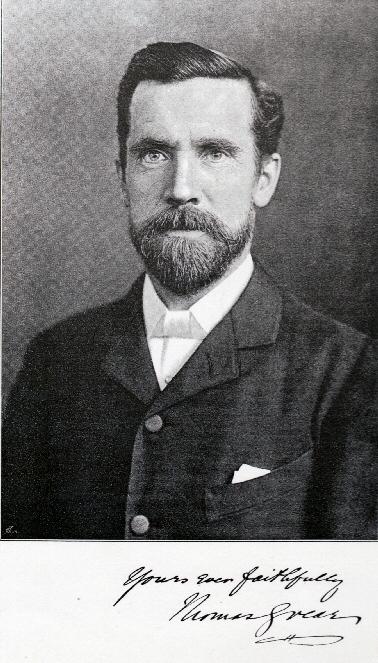 On
the 4th February, 1872, Mr. Thomas Grear, a student from Rotherham
College, commenced his ministry here. Immediately prior to coming he
had been engaged on some pastoral work at the English Reformed
Church in Hamburg. The ordination took place on November 6th, 1873.
The Rev. T. Arnold of Northampton expounded principles, Dr. Fielding
of Rotherham preached the Charge to the Minister, whilst that to the
Church was given by the Rev. J. P. Gledstone of London. The Revs. C.
C. Tyte of Rotherham, T. E. Noyes of Creaton and Samuel Yates of
Runcorn also took part.
On
the 4th February, 1872, Mr. Thomas Grear, a student from Rotherham
College, commenced his ministry here. Immediately prior to coming he
had been engaged on some pastoral work at the English Reformed
Church in Hamburg. The ordination took place on November 6th, 1873.
The Rev. T. Arnold of Northampton expounded principles, Dr. Fielding
of Rotherham preached the Charge to the Minister, whilst that to the
Church was given by the Rev. J. P. Gledstone of London. The Revs. C.
C. Tyte of Rotherham, T. E. Noyes of Creaton and Samuel Yates of
Runcorn also took part. -
-
Mr. Grear's special interest was
that of young people's work, and a children's service, a Band of
Hope and a Temperance Society were inaugurated by him. He was a man
of indomitable faith and untiring industry and his preaching was
simple and evangelical.
-
-
Mr. Grear left Buckby in 1877 to
become the assistant minister at Wellingborough and so ended "
five happy and pleasant years of loving labour for Christ amongst
those for whom he will ever cherish feelings of warmest affections."
After a successful ministry at Wellingborough, Mr. Grear moved to
Bishopsgate Chapel, London, which at that time was a most difficult
and almost derelict sphere. However, his influence soon became a
potent factor in the spiritual life of the business men of the city.
He laboured there until his death in 1922.
-
-
Mr. Grear was succeeded at Long
Buckby by the Rev- Thomas Ruston. A Yorkshireman by birth, Mr.
Ruston was trained at Rotherham and from 1865-1877 was the beloved
minister at Barton-on-Humber. He commenced his
ministry at Long Buckby on Sunday, 6th May, 1877 and the Recognition
Service was held on 3rd October of that year. Those taking part in
this service were the Revs. 'I'. Adams of Daventry, C. Nicholson of
Northampton, T. Grear of Wellingborough, ]. Cult of Paulerspury and
T. Henson of the local Baptist Church.
-
-
In 1879, Mr. S. S. Clarke who had
been Secretary and Superintendent of the Sunday School died and
bequeathed the sum of £500 for the erection of a new school.
The new school was built on ground given by Mr. T. Haynes and was
opened in December, 1880 after a sermon preached by the Rev. W.
Ervine of Hull. The total cost was £742 14s. 1d., the extra
amount being raised by the congregation.
-
-
In 1899, Mrs. A. E. Ruston offered
to present an organ to the church on condition that it was placed
downstairs. Hitherto, the organ had been in the gallery and the
choir had sat in the " Singers' Pew " near to it. It is
obvious that there had been some discontent about this arrangement,
no doubt due to the fact that it was becoming old fashioned to have
the choir in the gallery and also that " the singers' seats
were uncomfortable." The gift of the organ settled the affair.
It had to be downstairs and so the singers would also have to be
downstairs. Thus it has been ever since.
-
-
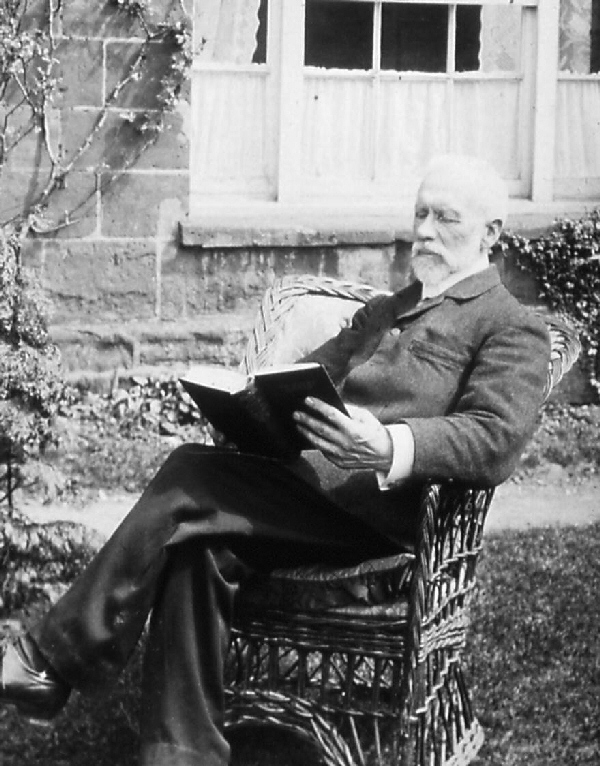 For
almost thirty-nine years, Mr. Ruston worked with untiring energy and
faithful devotion. He belonged to the same generation as Dr. R. W.
Dale and believed that Christianity was relevant to " every
department of human energy." His life was an example of
generosity and Christian service. He was a beloved pastor and always
had a friendly concern for anyone in need. Vagrants would never be
turned away without some gift. In the days when the railway was
brought through the district, he ministered to the needs of the
navvies. When the new shoe factory was opened in 1903 and there was
an influx of folk from Northampton and London, he, with others,
conducted services in the new factory and was among those who helped
to form the P.S.A. which was held every Sunday afternoon in the
Assembly Room. His interest in people also led him to give lifelong
service to the Temperance movement and for about thirty years he was
the Secretary of the Northamptonshire Temperance and Band of Hope
Union, a task that demanded much moral strength and Christian grace.
The organisations at the church were mostly connected with
the Temperance Movement, There was a Band of Hope for the children
and a Temperance Meeting for the adolescents, Growing out of these
meetings was the Long Buckby Temperance Band which, in its hey-day,
won many coveted awards. Another interesting piece of service was
the Children's Library. The books were kept in the Boys' School and
could be borrowed by the children of the Sunday School. This was in
the days prior to the present library system and when very few
people could afford to purchase books.
For
almost thirty-nine years, Mr. Ruston worked with untiring energy and
faithful devotion. He belonged to the same generation as Dr. R. W.
Dale and believed that Christianity was relevant to " every
department of human energy." His life was an example of
generosity and Christian service. He was a beloved pastor and always
had a friendly concern for anyone in need. Vagrants would never be
turned away without some gift. In the days when the railway was
brought through the district, he ministered to the needs of the
navvies. When the new shoe factory was opened in 1903 and there was
an influx of folk from Northampton and London, he, with others,
conducted services in the new factory and was among those who helped
to form the P.S.A. which was held every Sunday afternoon in the
Assembly Room. His interest in people also led him to give lifelong
service to the Temperance movement and for about thirty years he was
the Secretary of the Northamptonshire Temperance and Band of Hope
Union, a task that demanded much moral strength and Christian grace.
The organisations at the church were mostly connected with
the Temperance Movement, There was a Band of Hope for the children
and a Temperance Meeting for the adolescents, Growing out of these
meetings was the Long Buckby Temperance Band which, in its hey-day,
won many coveted awards. Another interesting piece of service was
the Children's Library. The books were kept in the Boys' School and
could be borrowed by the children of the Sunday School. This was in
the days prior to the present library system and when very few
people could afford to purchase books. -
Mr. Ruston had the privilege of
seeing one member of the Church enter the Congregational ministry.
He was Mr. George Packer and was trained at Nottingham Institute and
New College, London, his churches being at Hatfield and Royston.
-
-
The thirtieth anniversary of Mr.
Ruston's ministry co-incided with the two hundredth anniversary of
the church in 1907. The double anniversary was celebrated on 9th May
when about sixty sat down to lunch. Mr. John Clarke, a deacon,
presided and gave a welcome to the visitors. Mr. Ruston gave a brief
account of the two hundred years and then congratulations to church
and minister were given by the Rev. W. L. Lee, President of the
Northamptonshire Association of Congregational Churches and several
other speakers. At this meeting, Mr. J. T. Lewin of Wellingborough
and Mr. T. C. Thompson of Northampton representing the
Northamptonshire Temperance and Band of Hope Union presented Mr.
Ruston with an illuminated address and a purse of £25 as an
appreciation of his services over 27 years as secretary. The
visiting preacher for the occasion was the Rev. John Oates of North
Finchley. At the evening meeting, a purse containing £37 10s
0d. was presented to Mr. Ruston in the name of the congregation and
some outside friends by Mr. G. E. Fell, j.p., a churchwarden at the
Parish Church. On 18th May, an old scholars' tea and social was held
and about a hundred and fifty were present. Old scholars also took
part in the Sunday services. The Church Book records, " Many
were the expressions of gratitude for old teachers and contrasts
drawn between the hard times of the past and the easier of today."
-
-
Within a few years the storm broke
over troubled Europe and even those accustomed to the peace and
quiet of village life had to adjust themselves to war conditions.
Many young men, including several from the Manse, went forth and in
all, nine of those associated with the church gave their lives.
-
-
On 16th and 17th May, 1915, Mr.
Ruston celebrated the Jubilee of his ordination. On the Monday
afternoon, the Rev. Dr. J. D, Jones of Bournemouth preached to a
large congregation. There was another splendid congregation in the
evening when the Mayor of Daventry (Councillor J. Gardner) presided
and Dr. J . D. Jones was the chief speaker. In the course of his
address, Dr. Jones said, " I do not think that the best
preaching comes with short ministries. The man with three or five
year ministries tends to make his preaching impressionistic and
superficial.... Never was the need for the pulpit so great as today
in this great crisis. The war is sheer, unmitigated tragedy and if
that tragedy is not to be repeated, we must have more than
scientific culture. We must get back to the power of the pulpit."
Mr. Ruston responded to the many gracious speeches of greeting by a
brief speech in which he said that in his ministry he had sought to
unfold the meaning of the Bible. He had never found it difficult to
find a text to suit his subject and had never preached the same
sermon twice. Everyone was delighted that Mr. Ruston's health
allowed him to take such an active part in the day's proceedings,
but soon his illness returned and he intimated his intention to
retire from the pastorate. Before his resignation took effect, he
passed on into the nearer presence of God. The funeral service was
conducted by the Rev. C. S. Larkman of Northampton assisted by the
Rev. S. W. Bowser of the Baptist Church. Prayer at the grave was
offered by the Rev. G. Crossley, Vicar of Long Buckby.
-
-
In the chapel is a memorial tablet
which reads:—
-
SACRED
TO THE MEMORY OF
REV.
THOS. RUSTON,
WHO DEPARTED THIS LIFE
MARCH 4TH, 1916
AGED
78 YEARS
HE WAS THE FAITHFUL AND BELOVED
MINISTER OF THIS CHURCH FOR 39 YEARS.... 1877 TILL 1916.
"BLESSED ARE THE DEAD WHICH DIE
IN THE LORD,
THEY REST FROM THEIR LABOURS AND
THEIR WORKS DO FOLLOW THEM."
-
Almost immediately after the
announcement of Mr, Ruston's intention to retire, the pulpit was
supplied on two occasions by the Rev. Harry John Coxon of Rhymney,
South Wales. After the second visit, a Church Meeting was held and a
unanimous call to the pastorate was sent to him. Mr. Coxon accepted
the call and commenced his ministry on 3rd May, 1916.
-
-
It was whilst he was a member of
Tabernacle Congregational Church, Newport, that the deacons of that
church urged Mr. Coxon to prepare himself for the ministry. The
death of his father prevented his leaving for college and for a time
he worked at a trade in the mornings and studied in the afternoon
and evenings at Maindee College. In 1909 he was called to the
pastorate of Mount Carmel Congregational Church Rhymney and
subsequently passed the Congregational Union Examinations with
Honours. During his ministry the Rhymney Church doubled its
membership and Mr. Coxon saw the erection of a new church building.
-
-
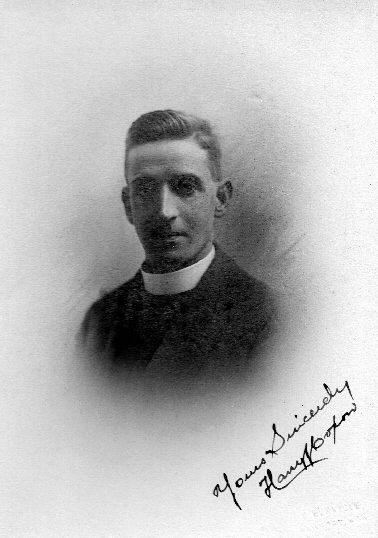 The
Long Buckby church flourished during Mr. Coxon's ministry. The
Sunday School was strong and companies of the Boys' Brigade and
Girls' Life Brigade were formed to assist in the work amongst
children and young people. A Christian Endeavour Society, the Band
of Hope and a Recreation Club all helped to make the chapel a centre
of spiritual, cultural and social life in the village.
The
Long Buckby church flourished during Mr. Coxon's ministry. The
Sunday School was strong and companies of the Boys' Brigade and
Girls' Life Brigade were formed to assist in the work amongst
children and young people. A Christian Endeavour Society, the Band
of Hope and a Recreation Club all helped to make the chapel a centre
of spiritual, cultural and social life in the village. -
-
An Improvements Fund was opened and
the Chapel was redecorated. Other improvements were made to the
premises including the building of a Minister's Vestry on the site
of the old Boys' School. As an appreciation of restored health, Mr.
J. Clarke gave £120, this being the cost of the vestry.
-
One of the leading officials of the
church during the ministries of Mr. Grear and Mr. Ruston was Mr.
George Robinson of the Grotto. He was Church Secretary, Treasurer
and odd job man. He was still in office at the commencement of Mr.
Coxon's ministry but passed away before the completion of it. He
bequeathed £200 to the General Fund and £50 to the
Sunday School. In 1922, Mr. Coxon accepted a unanimous call to
Normanton Road Congregational Church, Derby, and closed his ministry
at Buckby on the last Sunday of August. He later
ministered at Newcastle-under-Lyme (1932-1947) and Dover
(1947-1953). He now lives in retirement at Newport, Mon., and his
son, the Rev. Owen F. Coxon, B.A., B.D., is the minister of
Leytonstone Congregational Church, London.
-
-
On 6th November, 1922, a Special
Church Meeting sent a call to the Rev. Arthur Joseph Underwood of
Waunlwyn, Monmouthshire. He accepted the pastorate and commenced his
ministry on the first Sunday in 1923. The Induction took place on
8th February, those taking part including the Revs. H. H. Carlisle
(Moderator), Waldron Skinner of Newport, Mon., and H.J. Coxon.
-
Mr. Underwood had previously
ministered at Blackwood, Mon. (1894-1897), Waunlyd (1897-1901 and
1915-1922), Harrold (1901-1909), Kingsbridge (1909-1911) and Princes
Street, Devonport (1911 -1915).
-
-
During the ministry of Mr. Underwood
new windows were put in the chapel. The windows are of cathedral
glass and have a simple dignity. They replaced ones that were plain
glass and the frames of which were rotten.
-
-
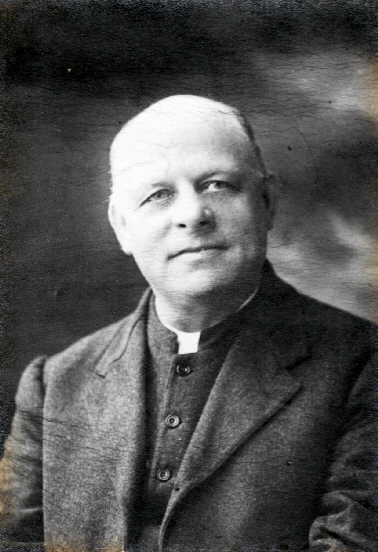 The
early thirties was a time of industrial depression and in 1933 the
factory closed down. Many families were forced to leave the village
and find work in other districts and those who remained faced
somewhat straightened circumstances. This inevitably reduced the
numbers of those attending church and Sunday School. It must be
said, however, that the finances of the chapel remained fairly solid
for " the people had a mind to work."
The
early thirties was a time of industrial depression and in 1933 the
factory closed down. Many families were forced to leave the village
and find work in other districts and those who remained faced
somewhat straightened circumstances. This inevitably reduced the
numbers of those attending church and Sunday School. It must be
said, however, that the finances of the chapel remained fairly solid
for " the people had a mind to work." -
One of the young men of the church
in Mr. Underwood's time is now in the ministry. He is the Rev.
Ronald W. Tomalin. After training at Lancashire Independent College,
he was minister at Congleton (1942-47), Whitchurch (Salop)
(1947-1954) and is now at March.
-
-
At the Annual Church Meeting held on
24th February, 1937, Mr. Underwood announced that it was his
intention to retire from the active ministry at the end of the
forthcoming September. Expressions of gratitude for the fine work
and faithful service of Mr. and Mrs. Underwood and Dorothy were made
by several members, and all present were unanimous in the hope that
Mr. and Mrs. Underwood would have a happy
retirement. Mr. Underwood did not reach Inn retirement. A fortnight
after he had announced his resignation, 10th March, he was called
home. The Rev. K. M. Drew (Moderator) conducted the funeral service
on the following Saturday and an old friend, the Rev. W.J. Palmer
gave the address. Mr. Palmer said, " He was generous to a
fault, if generosity ever could he a fault. He was a good Christian
in these days when there are so many weak-kneed Christians. He was
meant for the ministry. He had the equipment necessary —a well
stored mind, a good voice and an impressive delivery. He always had
the welfare of his people at heart." Mr. Underwood's daughter
Dorothy is the wife of the Rev. Levi Criddle of Tunbridge Wells.
-
-
The Rev. Morgan Rees Griffiths was
minister at Blaina in Monmouthsire when he was called to the Long
Buckby pastorate. He had been trained at Western College, Bristol.
Blaina was in a distressed area and much good work was done by Mr.
Griffiths during his three years' ministry there.
-
-
Before he and his family settled in
the Long Buckby Manse, repairs costing well over £200, were
effected.
-
Mr. Griffiths was a very keen
supporter of amateur dramatics and a society was formed in
connection with the church. Considerable sums of money were raised
for the church and kindred charities by this society.
-
-
In 1939, England again became
involved in a major war and whilst Mr. Griffiths took the pacifist
stand, he worked splendidly for the men who were in the army units
stationed in the district. In spite of many difficulties, not least
being the matter of catering, a canteen was provided for the
soldiers. One feature of its work was the Community Hymn Singing on
Sunday evenings. The church also remembered its own sons away from
home by sending them gifts as tokens of esteem.
-
-
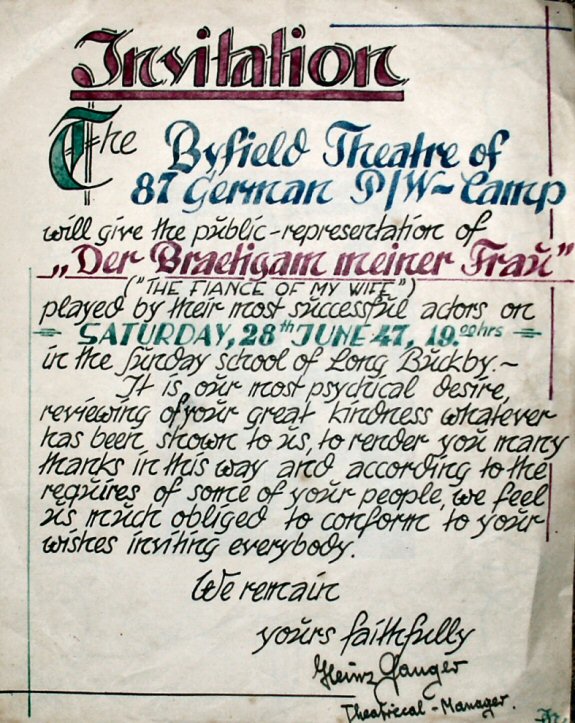 For
many years the heating apparatus of the chapel had caused some
anxiety. It soon became obvious that the period of its usefulness
was over and that new installations would have to be made. In 1945,
a licence was granted by the Minister of Works and electric heating
was installed at a cost of approximately £ 150.
For
many years the heating apparatus of the chapel had caused some
anxiety. It soon became obvious that the period of its usefulness
was over and that new installations would have to be made. In 1945,
a licence was granted by the Minister of Works and electric heating
was installed at a cost of approximately £ 150. -
-
When the war was over, regulations
concerning Prisoners of War were relaxed somewhat and the church was
able to show a caring spirit for the German prisoners who were
stationed locally. On several occasions, Pastor
Lucke, himself a prisoner, gave an address in German from the pulpit
for the prisoners in the congregation. Permanent friendships were
made and much good was done towards the building up of mutual
understanding.
-
-
Mr. Griffiths closed his ministry at
Buckby on 4th May, 1947, having accepted the call to Stafford
Congregational Church. At a farewell and presentation evening, the
school room was filled to capacity. Many friends not associated with
the church asked to be associated with the testimonial and were
present on this occasion. Many compliments were paid to Mr. and Mrs.
Griffiths, the speakers including the Vicar (the Rev. John Rowell),
the Baptist minister (the Rev. J. S. Swain) and the Prisoner of War
Camp Leader. Mr. Griffiths moved from Stafford to Weston-super-Mare
in 1949.
-
-
The " interregnum " lasted
over a year. Although the church was interested in several outgoing
men from the colleges, no settlement could be effected. During this
time, Mr. F. W. P. Harris, a student of Mansfield College, spent his
vacations as " student pastor " at Buckby and gave much
valued assistance.
-
-
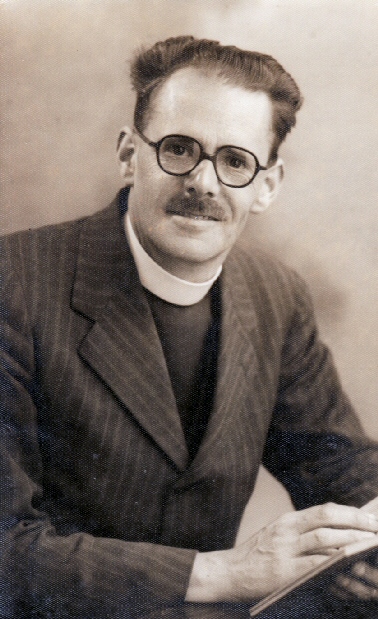 On
2nd May, 1948, Mr. Leonard George Waters of Paton College preached
at Long Buckby for the first time. He was asked to pay another visit
with a definite view to the pastorate which he did on the following
Whit Sunday. At the subsequent Church Meeting, a unanimous
invitation was given to Mr. Waters who then accepted the call. Prior
to his training at Paton College, Mr. Waters had given ministerial
oversight at Whitehawk Congregational Church Hall Brighton. Mr.
Waters was ordained to the Christian ministry and inducted to the
Buckby pastorate on 26th June, 1948, those taking part including the
Revs. J. F. S. Solomon (Moderator), J. G. McKenzie, R. R. Turner,
(both of Paton College) and Morgan R. Griffiths (former minister).
On
2nd May, 1948, Mr. Leonard George Waters of Paton College preached
at Long Buckby for the first time. He was asked to pay another visit
with a definite view to the pastorate which he did on the following
Whit Sunday. At the subsequent Church Meeting, a unanimous
invitation was given to Mr. Waters who then accepted the call. Prior
to his training at Paton College, Mr. Waters had given ministerial
oversight at Whitehawk Congregational Church Hall Brighton. Mr.
Waters was ordained to the Christian ministry and inducted to the
Buckby pastorate on 26th June, 1948, those taking part including the
Revs. J. F. S. Solomon (Moderator), J. G. McKenzie, R. R. Turner,
(both of Paton College) and Morgan R. Griffiths (former minister). -
-
Mr. Waters will be long remembered
for the valiant work he did with the renovation of chapel premises,
for he was indefatigable in this cause. On 17th March, 1951, the
chapel was re-opened after the completion of repairs and renovations
costing £350. The chapel was re-decorated; the old box pews
(victims of woodworm) were removed and reconditioned ones from a
disused chapel at Woburn were put in and the aisles widened.
At the re-opening service, the speakers were the Revs.
Douglas A. Smith of Howard Church,Bedford, and M. R. Griffiths of
Weston-super-Mare. Later, the large school was completely renovated
and redecorated.
-
-
The valuable and helpful pastoral
ministry of Mr. Waters will also he remembered. He was a very
welcome visitor at many homes including a number who were not
connected with the church. Mr. Waters moved to Wareham in September,
1953 and is now at Chard. The Rev. Leslie Smith Ivory commenced his
ministry in February, 1954 and the Induction took place on 13th
March. Those taking part in the Induction Service were the Revs. J.
F. S. Solomon (Moderator), A. T. Swaffield (Baptist minister), M.
Mostyn Robinson (Vicar), Leonard G. Waters (former minister), A.
Lionel Willoughby (the minister at Mr. Ivory's home church at
Wellingborough) and John W. Edmondson (Northampton).
-
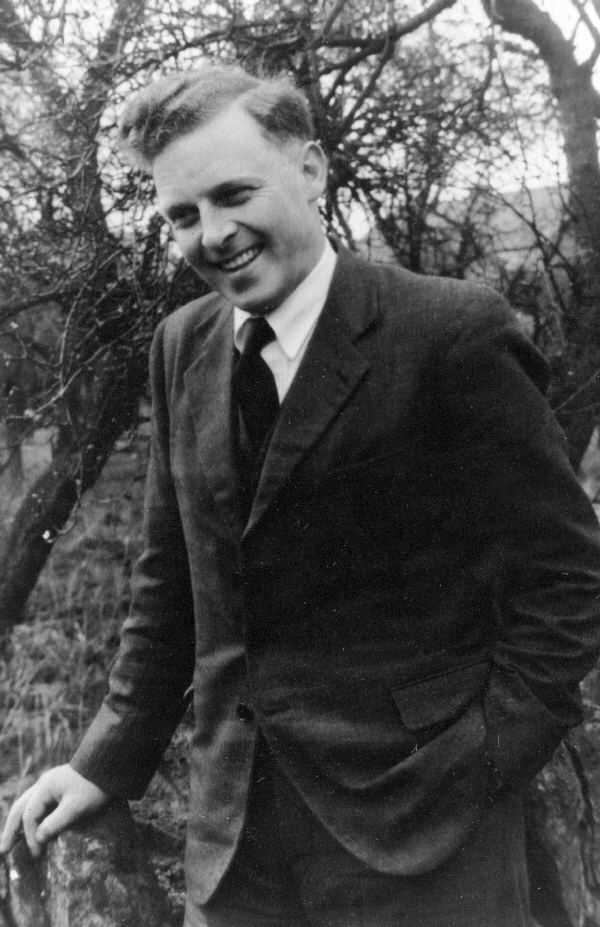 The
work of the church and its organisations has kept up a good pace.
The Sunday School is in a fairly healthy condition though many
developments could take place if more teachers were forthcoming.
There is a Youth Club and Tennis Club and on Sunday evenings after
worship the young people gather together for an informal hour. The
Ladies' Working Party is a live group which works all the year round
in preparation for the Annual Sale of Work and produces amazing
financial results. Without any doubt, our worship is enhanced by the
leadership in praise which is given by the choir. Regular practices
and good training have produced excellent results and the use of "
Congregational Praise " has helped the church to use the best
of verse and music in its psalmody. A recent innovation in church
life has been the Thursday morning service in which a book from the
Bible is systematically studied.
The
work of the church and its organisations has kept up a good pace.
The Sunday School is in a fairly healthy condition though many
developments could take place if more teachers were forthcoming.
There is a Youth Club and Tennis Club and on Sunday evenings after
worship the young people gather together for an informal hour. The
Ladies' Working Party is a live group which works all the year round
in preparation for the Annual Sale of Work and produces amazing
financial results. Without any doubt, our worship is enhanced by the
leadership in praise which is given by the choir. Regular practices
and good training have produced excellent results and the use of "
Congregational Praise " has helped the church to use the best
of verse and music in its psalmody. A recent innovation in church
life has been the Thursday morning service in which a book from the
Bible is systematically studied. -
-
The year 1957 is a jubilant one for
it marks the 250th anniversary of the cause. On 10th March, special
services were held when the preacher was the Rev. Dr. W. Gordon
Robinson of Lancashire Independent College. The Parish Council under
their chairman (Councillor A. G. Cox, j.p.) attended the evening
service thereby giving civic recognition to the occasion. Letters of
greeting from the Anglican and Baptist Churches
were read. On Whit Monday a further celebration was held when about
eighty members and friends from the Aylesbury (Congregational
(Church came for a tea and service. The Aylesbury Church was also
founded in 1707 and at their instigation, this united service was
arranged. The special preacher was the Rev. Dr. N.J. McLellan of
East Hill Congregational Church, Wandsworth. A return visit to
Aylesbury was made on 13th July. The minister of Wethersfield
Congregational Church, Essex which is celebrating the 250th
anniversary of its present building, the Rev. Anthony Ray, visited
the district and brought the greetings of his church when he
attended morning worship on 28th July, 1957- Other celebrations
there will be, some framed in the solemnity of worship and others in
the gay spirit of a social occasion, but all in deep thankfulness to
Almighty God for all that He has done through the Long Buckby
Congregational Church.
-
-
The celebration of this anniversary
affords a point of vantage from which we may see the panorama of the
years and feel the privilege which is ours—to follow in the
train of such a glorious company of the Master's disciples. In
thanking God for the past, let us re-dedicate ourselves for the
future.
-
" God of our fathers, be the
God Of their succeeding race."
The years since then have seen five
minsterial changes. Leslie Ivory retired in 1963 and was followed in
1964 by the Rev. Robert Emery, he left in 1967 to be replaced in
1968 by Rev. Kenneth Hilton.
In 1973 he left to be succeeded by Rev. Conrad Husk who continued
until his retirement in 1995.
There was then a break of six years before a new Minister was
appointed, the Rev.Yvonne Stone started her Ministry in 2001 and
left to go to Coventry in 2008.
In 2010 another Minister was appointed Rev. Rosemary Solomon, she
left in 2014 to go to Rose Hill in Chesterfield.
-
 After
Mr. Walker's departure, there was an interregnum until 1763.
Although pastorless, the church managed to weather the storm, though
it would appear that many members were admonished for non-attendance
during this period. The following is a copy of one of the few
records we have of the period :—
After
Mr. Walker's departure, there was an interregnum until 1763.
Although pastorless, the church managed to weather the storm, though
it would appear that many members were admonished for non-attendance
during this period. The following is a copy of one of the few
records we have of the period :— The new Meeting House was built
and opened for worship in 1771. There are no records to tell us of
the intense joy that would be in the heart of the worshippers, or
the exultant praise on their lips. We can only imagine their
feelings and be thankful to Almighty God for His guidance and their
enterprise.
The new Meeting House was built
and opened for worship in 1771. There are no records to tell us of
the intense joy that would be in the heart of the worshippers, or
the exultant praise on their lips. We can only imagine their
feelings and be thankful to Almighty God for His guidance and their
enterprise. The
ministry of Mr. Griffiths continued at Buckby for 39 years. In 1819,
the congregation having much increased " the chapel was
enlarged and a fourth gallery was erected behind the pulpit. In the
September of that year, the chapel was re-opened and special sermons
on the occasion were preached by the Revs. Toller of Kettering and
Robertson of Stretton. In 1825, a new schoolroom was erected by a
legacy of Mr. David Ashby supplemented by other members of the
family. During the ministry of Mr. Griffiths, the village chapels at
East Haddon and Whilton were erected. Mr. Griffiths used to "
lecture " once a month in a private house in East Haddon and so
many people desired to hear him that 2
The
ministry of Mr. Griffiths continued at Buckby for 39 years. In 1819,
the congregation having much increased " the chapel was
enlarged and a fourth gallery was erected behind the pulpit. In the
September of that year, the chapel was re-opened and special sermons
on the occasion were preached by the Revs. Toller of Kettering and
Robertson of Stretton. In 1825, a new schoolroom was erected by a
legacy of Mr. David Ashby supplemented by other members of the
family. During the ministry of Mr. Griffiths, the village chapels at
East Haddon and Whilton were erected. Mr. Griffiths used to "
lecture " once a month in a private house in East Haddon and so
many people desired to hear him that 2
 The
Rev. Henry William Butcher who succeeded Mr. Evans in the Buckby
pastorate was born in London in 1833. His parents were Wesleyans and
to their simple teaching he owed much, but when he left home, he met
situations which seemed to attract him from the Christian way of
life. A spiritual experience, however, led him to become a member of
Claremont Chapel, Pentonville in 1851. Sometime later he felt
impelled to enter the ministry and with the help of his revered
pastor, the Rev. John Blackburn, he prepared himself for the work
and was admitted to Cheshunt College for training. After acting as
an assistant minister at Guildford for a time, he accepted the call
to Long Buckby and commenced his ministry in March, 1859.
The
Rev. Henry William Butcher who succeeded Mr. Evans in the Buckby
pastorate was born in London in 1833. His parents were Wesleyans and
to their simple teaching he owed much, but when he left home, he met
situations which seemed to attract him from the Christian way of
life. A spiritual experience, however, led him to become a member of
Claremont Chapel, Pentonville in 1851. Sometime later he felt
impelled to enter the ministry and with the help of his revered
pastor, the Rev. John Blackburn, he prepared himself for the work
and was admitted to Cheshunt College for training. After acting as
an assistant minister at Guildford for a time, he accepted the call
to Long Buckby and commenced his ministry in March, 1859. On
the 4th February, 1872, Mr. Thomas Grear, a student from Rotherham
College, commenced his ministry here. Immediately prior to coming he
had been engaged on some pastoral work at the English Reformed
Church in Hamburg. The ordination took place on November 6th, 1873.
The Rev. T. Arnold of Northampton expounded principles, Dr. Fielding
of Rotherham preached the Charge to the Minister, whilst that to the
Church was given by the Rev. J. P. Gledstone of London. The Revs. C.
C. Tyte of Rotherham, T. E. Noyes of Creaton and Samuel Yates of
Runcorn also took part.
On
the 4th February, 1872, Mr. Thomas Grear, a student from Rotherham
College, commenced his ministry here. Immediately prior to coming he
had been engaged on some pastoral work at the English Reformed
Church in Hamburg. The ordination took place on November 6th, 1873.
The Rev. T. Arnold of Northampton expounded principles, Dr. Fielding
of Rotherham preached the Charge to the Minister, whilst that to the
Church was given by the Rev. J. P. Gledstone of London. The Revs. C.
C. Tyte of Rotherham, T. E. Noyes of Creaton and Samuel Yates of
Runcorn also took part. For
almost thirty-nine years, Mr. Ruston worked with untiring energy and
faithful devotion. He belonged to the same generation as Dr. R. W.
Dale and believed that Christianity was relevant to " every
department of human energy." His life was an example of
generosity and Christian service. He was a beloved pastor and always
had a friendly concern for anyone in need. Vagrants would never be
turned away without some gift. In the days when the railway was
brought through the district, he ministered to the needs of the
navvies. When the new shoe factory was opened in 1903 and there was
an influx of folk from Northampton and London, he, with others,
conducted services in the new factory and was among those who helped
to form the P.S.A. which was held every Sunday afternoon in the
Assembly Room. His interest in people also led him to give lifelong
service to the Temperance movement and for about thirty years he was
the Secretary of the Northamptonshire Temperance and Band of Hope
Union, a task that demanded much moral strength and Christian grace.
The organisations at the church were mostly connected
For
almost thirty-nine years, Mr. Ruston worked with untiring energy and
faithful devotion. He belonged to the same generation as Dr. R. W.
Dale and believed that Christianity was relevant to " every
department of human energy." His life was an example of
generosity and Christian service. He was a beloved pastor and always
had a friendly concern for anyone in need. Vagrants would never be
turned away without some gift. In the days when the railway was
brought through the district, he ministered to the needs of the
navvies. When the new shoe factory was opened in 1903 and there was
an influx of folk from Northampton and London, he, with others,
conducted services in the new factory and was among those who helped
to form the P.S.A. which was held every Sunday afternoon in the
Assembly Room. His interest in people also led him to give lifelong
service to the Temperance movement and for about thirty years he was
the Secretary of the Northamptonshire Temperance and Band of Hope
Union, a task that demanded much moral strength and Christian grace.
The organisations at the church were mostly connected  The
Long Buckby church flourished during Mr. Coxon's ministry. The
Sunday School was strong and companies of the Boys' Brigade and
Girls' Life Brigade were formed to assist in the work amongst
children and young people. A Christian Endeavour Society, the Band
of Hope and a Recreation Club all helped to make the chapel a centre
of spiritual, cultural and social life in the village.
The
Long Buckby church flourished during Mr. Coxon's ministry. The
Sunday School was strong and companies of the Boys' Brigade and
Girls' Life Brigade were formed to assist in the work amongst
children and young people. A Christian Endeavour Society, the Band
of Hope and a Recreation Club all helped to make the chapel a centre
of spiritual, cultural and social life in the village. The
early thirties was a time of industrial depression and in 1933 the
factory closed down. Many families were forced to leave the village
and find work in other districts and those who remained faced
somewhat straightened circumstances. This inevitably reduced the
numbers of those attending church and Sunday School. It must be
said, however, that the finances of the chapel remained fairly solid
for " the people had a mind to work."
The
early thirties was a time of industrial depression and in 1933 the
factory closed down. Many families were forced to leave the village
and find work in other districts and those who remained faced
somewhat straightened circumstances. This inevitably reduced the
numbers of those attending church and Sunday School. It must be
said, however, that the finances of the chapel remained fairly solid
for " the people had a mind to work." For
many years the heating apparatus of the chapel had caused some
anxiety. It soon became obvious that the period of its usefulness
was over and that new installations would have to be made. In 1945,
a licence was granted by the Minister of Works and electric heating
was installed at a cost of approximately £ 150.
For
many years the heating apparatus of the chapel had caused some
anxiety. It soon became obvious that the period of its usefulness
was over and that new installations would have to be made. In 1945,
a licence was granted by the Minister of Works and electric heating
was installed at a cost of approximately £ 150. On
2nd May, 1948, Mr. Leonard George Waters of Paton College preached
at Long Buckby for the first time. He was asked to pay another visit
with a definite view to the pastorate which he did on the following
Whit Sunday. At the subsequent Church Meeting, a unanimous
invitation was given to Mr. Waters who then accepted the call. Prior
to his training at Paton College, Mr. Waters had given ministerial
oversight at Whitehawk Congregational Church Hall Brighton. Mr.
Waters was ordained to the Christian ministry and inducted to the
Buckby pastorate on 26th June, 1948, those taking part including the
Revs. J. F. S. Solomon (Moderator), J. G. McKenzie, R. R. Turner,
(both of Paton College) and Morgan R. Griffiths (former minister).
On
2nd May, 1948, Mr. Leonard George Waters of Paton College preached
at Long Buckby for the first time. He was asked to pay another visit
with a definite view to the pastorate which he did on the following
Whit Sunday. At the subsequent Church Meeting, a unanimous
invitation was given to Mr. Waters who then accepted the call. Prior
to his training at Paton College, Mr. Waters had given ministerial
oversight at Whitehawk Congregational Church Hall Brighton. Mr.
Waters was ordained to the Christian ministry and inducted to the
Buckby pastorate on 26th June, 1948, those taking part including the
Revs. J. F. S. Solomon (Moderator), J. G. McKenzie, R. R. Turner,
(both of Paton College) and Morgan R. Griffiths (former minister). The
work of the church and its organisations has kept up a good pace.
The Sunday School is in a fairly healthy condition though many
developments could take place if more teachers were forthcoming.
There is a Youth Club and Tennis Club and on Sunday evenings after
worship the young people gather together for an informal hour. The
Ladies' Working Party is a live group which works all the year round
in preparation for the Annual Sale of Work and produces amazing
financial results. Without any doubt, our worship is enhanced by the
leadership in praise which is given by the choir. Regular practices
and good training have produced excellent results and the use of "
Congregational Praise " has helped the church to use the best
of verse and music in its psalmody. A recent innovation in church
life has been the Thursday morning service in which a book from the
Bible is systematically studied.
The
work of the church and its organisations has kept up a good pace.
The Sunday School is in a fairly healthy condition though many
developments could take place if more teachers were forthcoming.
There is a Youth Club and Tennis Club and on Sunday evenings after
worship the young people gather together for an informal hour. The
Ladies' Working Party is a live group which works all the year round
in preparation for the Annual Sale of Work and produces amazing
financial results. Without any doubt, our worship is enhanced by the
leadership in praise which is given by the choir. Regular practices
and good training have produced excellent results and the use of "
Congregational Praise " has helped the church to use the best
of verse and music in its psalmody. A recent innovation in church
life has been the Thursday morning service in which a book from the
Bible is systematically studied.